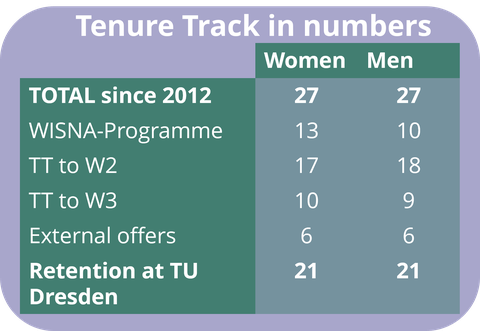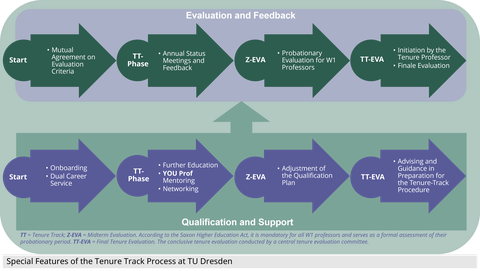Tenure Track at TU Dresden
Table of contents
Proven tradition with an innovative orientation
Our tenure-track system combines proven structures with innovative creative drive – for fair, transparent and sustainable scientific careers. A model that sets standards.
TU Dresden is one of the pioneers of the tenure track in Germany. Our tenure track system, introduced in 2012, is an expression of our claim as a University of Excellence: to give outstanding scientists space for independent research, responsibility and personal development at an early stage. Through our membership in the DRESDEN-concept network, tenure-track scientists benefit from unique collaborations – with non-university research institutions, cultural partners and regional innovation actors. This interdisciplinary networking is a core feature of our innovative orientation.
Tenure Track in Numbers
Since 2012, more than 50 tenure-track professorships have been filled on an equal basis. Currently, 21 female and 21 male scientists from the tenure track system shape research, teaching and university-wide development at TUD (As of 06/2025).
Paths to Professoship
The system offers three tailor-made paths to a permanent professorship – tailored to different career phases:
- Junior research group leaders ( advanced R21 / transition R2/R3) with tenure track to W2 (comparable to Associate Professor) with excellent conditions and strategic support.
- W1 junior professors (R3) with tenure track at W2 (comparable to Associate Professor) with room for independent research and systematic development.
- Experienced W2 professors (advanced R3 / transition R3/R4) with tenure track to W3 (comparable to Full Professor) who contribute their expertise to the shaping of our university.
Performance, responsibility, development in interaction
We support leaders who shape science and institutions in equal measure – shaped by expertise, commitment and development.
A tenure-track professorship combines individual excellence in research, teaching and transfer with professional competence in leadership, self-administration and continuous professionalisation. These six elements – shown as gears in the figure below – interlock and form a learning system with repercussions:
- Excellent research generates knowledge, research-oriented teaching imparts it, and transfer opens up the social impact of this knowledge.
- Leadership responsibility provides impetus for self-administration and feeds practical knowledge. These learning processes – deepened through continuous training – have an effect to strengthen leadership skills.
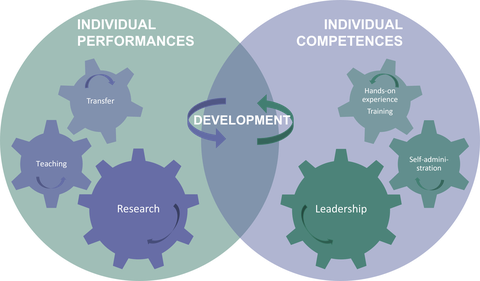
Individual performance and competencies jointly provide a robust basis for awarding a tenured professorship
The dynamic interaction between individual achievements and competencies drives scientific excellence and enriches the university culture. At the same time, institutional and organizational responsibility is growing in order to meet the demands of a professorship.
Multidimensional excellence in the tenure-track system
A responsible tenure-track system invests specifically in scientific talent in order to sustainably develop excellent research personalities and to preserve science in the long term.
TU Dresden's tenure-track system is anchored on two complementary levels Evaluation and Feedback as well as Qualification and Support and offers following benefits:
-
targeted processes for tenure success
-
holistic tenure evaluation
-
structured support from the very beginning
The following graphic illustrates the mechanism:
Evaluation and Feedback
The "Evaluation and Feedback" level creates optimal framework conditions from the outset by the university and the candidate jointly defining binding tenure criteria as a transparent orientation framework. Annual status discussions take stock of progress as strategic milestones and enable targeted adjustments. The interim evaluation of W1 professorships is a formal probation determination and provides impetus for professional and personal development.
TU Dresden's tenure-track system stands for a multidimensional understanding of academic excellence. The categories of research, teaching, knowledge transfer as well as academic self-administration and commitment – operationalized by specific evaluation criteria – are deepened by leadership awareness as a connecting element. It is only this attitude – manifested in role model function, design responsibility and development promotion – that gives excellence lasting impact.
Qualification and Support
The "Qualification and Support" level enables optimal starting conditions right from the start: structured onboarding facilitates institutional integration, while dual career service and family support relieve the personal situation. The YOUProf-Program continuously provides needs-based offers – from mentoring and coaching for strategic and professional development to networking and career advice for alternative careers.
The creation of tenure track positions is supported by, among others, the BMFTR programme of the German federal and state governments for the promotion of young academics and the Else Kröner-Fresenius Foundation.
Questions and Answers
‘Tenure track’ refers to a structured appointment procedure that allows for the direct transition from temporary to permanent professorship, provided that the probationary phase (usually six years) is successfully completed. This transition occurs without a new call for applications.
No. The tenure option, i.e. the binding commitment to the appointment of a lifetime professorship, must be explicitly stated in the vacancy advertisement. Only this way, a tenure evaluation procedure can be initiated.
Upon entering the service of the temporary (junior) professorship, the evaluation goals and criteria are agreed on by mutual agreement between the Rector, Chancellor, Dean and the (Junior) Professor.
The procedure will be opened upon request. Eligible applicants are (junior) professors and (junior) professors with tenure track.
There are no fixed deadlines for the initiation of the procedure. Experience has shown that the commission needs six to nine months to complete the evaluation process, after which it will be necessary to consult the faculty council until the rector can take the final tenure decision. It is therefore advisable to submit the application for opening no later than eighteen months before the end of the temporary (junior) professorship.
Contact
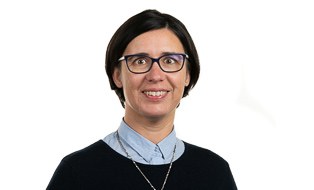 © Michael Kretzschmar/TUD
© Michael Kretzschmar/TUD
YOU PROF Young Professors Program
NameAlena Fröde
Send encrypted email via the SecureMail portal (for TUD external users only).
Visiting address:
Günther-Landgraf-Bau (GLB), room 7-116 Mommsenstr. 15
01069 Dresden
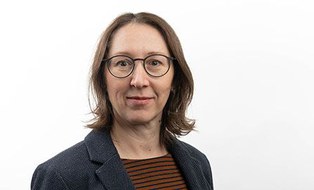 © Sven Ellger/TUD
© Sven Ellger/TUD
Appointments Focus Tenure Track
NameDr. Elena Wiederhold
Send encrypted email via the SecureMail portal (for TUD external users only).
Visiting address:
Günther-Landgraf-Bau, Room 7-116 Mommsenstraße 15
01067 Dresden
Fußnoten
-
For more information visit the page of the European Commission.
Funded by the Federal Ministry of Research, Technology and Space (BMFTR) and the Free State of Saxony as part of the Excellence Strategy of the Federal and State Government

